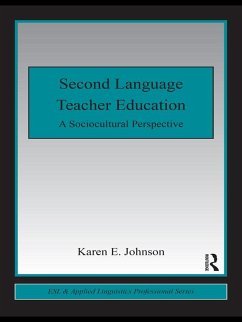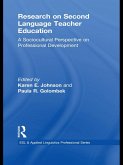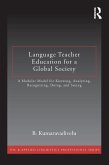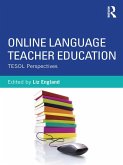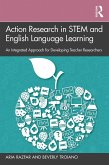51,95 €
51,95 €
inkl. MwSt.
Sofort per Download lieferbar

26 °P sammeln
51,95 €
Als Download kaufen

51,95 €
inkl. MwSt.
Sofort per Download lieferbar

26 °P sammeln
Jetzt verschenken
Alle Infos zum eBook verschenken
51,95 €
inkl. MwSt.
Sofort per Download lieferbar
Alle Infos zum eBook verschenken

26 °P sammeln
- Format: PDF
- Merkliste
- Auf die Merkliste
- Bewerten Bewerten
- Teilen
- Produkt teilen
- Produkterinnerung
- Produkterinnerung

Bitte loggen Sie sich zunächst in Ihr Kundenkonto ein oder registrieren Sie sich bei
bücher.de, um das eBook-Abo tolino select nutzen zu können.
Hier können Sie sich einloggen
Hier können Sie sich einloggen
Sie sind bereits eingeloggt. Klicken Sie auf 2. tolino select Abo, um fortzufahren.

Bitte loggen Sie sich zunächst in Ihr Kundenkonto ein oder registrieren Sie sich bei bücher.de, um das eBook-Abo tolino select nutzen zu können.
This book presents a comprehensive overview of the epistemological underpinnings of a sociocultural perspective on human learning and addresses in detail what this perspective has to offer the field of second language teacher education.
- Geräte: PC
- mit Kopierschutz
- eBook Hilfe
- Größe: 0.8MB
Andere Kunden interessierten sich auch für
![Research on Second Language Teacher Education (eBook, PDF) Research on Second Language Teacher Education (eBook, PDF)]() Research on Second Language Teacher Education (eBook, PDF)56,95 €
Research on Second Language Teacher Education (eBook, PDF)56,95 €![Doing Action Research in English Language Teaching (eBook, PDF) Doing Action Research in English Language Teaching (eBook, PDF)]() Anne BurnsDoing Action Research in English Language Teaching (eBook, PDF)33,95 €
Anne BurnsDoing Action Research in English Language Teaching (eBook, PDF)33,95 €![Language Teacher Education for a Global Society (eBook, PDF) Language Teacher Education for a Global Society (eBook, PDF)]() B. KumaravadiveluLanguage Teacher Education for a Global Society (eBook, PDF)51,95 €
B. KumaravadiveluLanguage Teacher Education for a Global Society (eBook, PDF)51,95 €![The Reflexive Teacher Educator in TESOL (eBook, PDF) The Reflexive Teacher Educator in TESOL (eBook, PDF)]() Julian EdgeThe Reflexive Teacher Educator in TESOL (eBook, PDF)47,95 €
Julian EdgeThe Reflexive Teacher Educator in TESOL (eBook, PDF)47,95 €![English Language Teacher Preparation in Asia (eBook, PDF) English Language Teacher Preparation in Asia (eBook, PDF)]() English Language Teacher Preparation in Asia (eBook, PDF)41,95 €
English Language Teacher Preparation in Asia (eBook, PDF)41,95 €![Online Language Teacher Education (eBook, PDF) Online Language Teacher Education (eBook, PDF)]() Online Language Teacher Education (eBook, PDF)51,95 €
Online Language Teacher Education (eBook, PDF)51,95 €![Action Research in STEM and English Language Learning (eBook, PDF) Action Research in STEM and English Language Learning (eBook, PDF)]() Aria RazfarAction Research in STEM and English Language Learning (eBook, PDF)41,95 €
Aria RazfarAction Research in STEM and English Language Learning (eBook, PDF)41,95 €-
-
-
This book presents a comprehensive overview of the epistemological underpinnings of a sociocultural perspective on human learning and addresses in detail what this perspective has to offer the field of second language teacher education.
Dieser Download kann aus rechtlichen Gründen nur mit Rechnungsadresse in A, B, BG, CY, CZ, D, DK, EW, E, FIN, F, GR, HR, H, IRL, I, LT, L, LR, M, NL, PL, P, R, S, SLO, SK ausgeliefert werden.
Produktdetails
- Produktdetails
- Verlag: Taylor & Francis eBooks
- Seitenzahl: 160
- Erscheinungstermin: 2. Juni 2009
- Englisch
- ISBN-13: 9781135967420
- Artikelnr.: 42983780
- Verlag: Taylor & Francis eBooks
- Seitenzahl: 160
- Erscheinungstermin: 2. Juni 2009
- Englisch
- ISBN-13: 9781135967420
- Artikelnr.: 42983780
- Herstellerkennzeichnung Die Herstellerinformationen sind derzeit nicht verfügbar.
______________________________________________________________________________________
Karen E. Johnson is Liberal Arts Research Professor of Applied Linguistics at The Pennsylvania State University, and Co-director of the Center for Advance Language Proficiency Education and Research
Karen E. Johnson is Liberal Arts Research Professor of Applied Linguistics at The Pennsylvania State University, and Co-director of the Center for Advance Language Proficiency Education and Research
Preface
Chapter 1: Defining a Sociocultural Perspective
Changing Points of View
Teachers as Learners of Teaching
Language as Social Practice
Teaching as Dialogic Mediation
Macro-Structures and the L2 Teaching Profession
Inquiry-Based Approaches to Professional Development
Future Challenges for L2 Teacher Education
Chapter 2: Shifting Epistemologies in Teacher Education
Overcoming a Positivistic Epistemological Perspective
Shifting towards an Interpretative Epistemological Perspective
Emerging Research on Teacher Cognition
Reconceptualizing the Knowledge-base of L2 Teacher Education
A Sociocultural Perspective on L2 Teacher Education
Chapter 3: Teachers as Learners of Teaching
Understanding Teacher Learning from a Sociocultural Perspective
"Seeing" Teaching Learning
Teacher-Authored Accounts of Professional Development
Mediational Means in the Zone of Proximal Development
Disciplinary Knowledge and Concept Development
Transformation of Activity: Teacher Learning - Student Learning
Chapter 4: Language as Social Practice
Defining Knowledge About Language
Language as Social Practice
Embracing Language as Social Practice in L2 Teacher Education
Developing Teachers' Awareness of Language as Social Practice
Analyzing E-mail Messages
Analyzing Classroom Transcripts
Building Curriculum from Contexts of Use
Chapter 5: Teaching as Dialogic Mediation
Teaching, Learning, and Development
The Development of Conceptual Thinking
Reconceptualizing the Concepts of Methodology, Language', and
Teaching
Reconceptualizing Reading Comprehension Instruction
Scaffolded Learning and Assisting Performance
Teachers' Questioning Patterns
Maximizing Classroom Interaction
Chapter 6: Macro-Structures and the Second Language Teaching Profession
Activity Theory: An Overview
Educational Reforms Policies
English Language Educational Reform Policies in South Korea
Contradictions and Interventions
Redesigning a School Community: The Case of a Finnish Middle
School
Implementing Educational Reform Policies: The Teaching
Practicum in South Korea
The Power of High-Stakes Language Testing
Constructing a Student: The Case of Joon
Constructing a Student: The Case of Noelle
Chapter 7: Inquiry-based Approaches to Professional Development
The Narrative Nature of Teachers' Accounts
The School Context and Culture in which Teachers' Accounts Emerge
Linkages between Teachers' Accounts and Professional Discourses
The Zone of Proximal Development as a Mediational Space
Models of Inquiry-Based Professional Development
Critical Friends Groups
Peer Coaching
Lesson Study Groups
Cooperative Development
Teacher Study Groups
Chapter 8: Future Challenges for Second Language Teacher Education
'Located' Second Language Teacher Education
Linking Teacher Learning and Student Learning
Intellectual Tools of Inquiry vs. The Politics of Accountability
Subject Index
Author Index
Chapter 1: Defining a Sociocultural Perspective
Changing Points of View
Teachers as Learners of Teaching
Language as Social Practice
Teaching as Dialogic Mediation
Macro-Structures and the L2 Teaching Profession
Inquiry-Based Approaches to Professional Development
Future Challenges for L2 Teacher Education
Chapter 2: Shifting Epistemologies in Teacher Education
Overcoming a Positivistic Epistemological Perspective
Shifting towards an Interpretative Epistemological Perspective
Emerging Research on Teacher Cognition
Reconceptualizing the Knowledge-base of L2 Teacher Education
A Sociocultural Perspective on L2 Teacher Education
Chapter 3: Teachers as Learners of Teaching
Understanding Teacher Learning from a Sociocultural Perspective
"Seeing" Teaching Learning
Teacher-Authored Accounts of Professional Development
Mediational Means in the Zone of Proximal Development
Disciplinary Knowledge and Concept Development
Transformation of Activity: Teacher Learning - Student Learning
Chapter 4: Language as Social Practice
Defining Knowledge About Language
Language as Social Practice
Embracing Language as Social Practice in L2 Teacher Education
Developing Teachers' Awareness of Language as Social Practice
Analyzing E-mail Messages
Analyzing Classroom Transcripts
Building Curriculum from Contexts of Use
Chapter 5: Teaching as Dialogic Mediation
Teaching, Learning, and Development
The Development of Conceptual Thinking
Reconceptualizing the Concepts of Methodology, Language', and
Teaching
Reconceptualizing Reading Comprehension Instruction
Scaffolded Learning and Assisting Performance
Teachers' Questioning Patterns
Maximizing Classroom Interaction
Chapter 6: Macro-Structures and the Second Language Teaching Profession
Activity Theory: An Overview
Educational Reforms Policies
English Language Educational Reform Policies in South Korea
Contradictions and Interventions
Redesigning a School Community: The Case of a Finnish Middle
School
Implementing Educational Reform Policies: The Teaching
Practicum in South Korea
The Power of High-Stakes Language Testing
Constructing a Student: The Case of Joon
Constructing a Student: The Case of Noelle
Chapter 7: Inquiry-based Approaches to Professional Development
The Narrative Nature of Teachers' Accounts
The School Context and Culture in which Teachers' Accounts Emerge
Linkages between Teachers' Accounts and Professional Discourses
The Zone of Proximal Development as a Mediational Space
Models of Inquiry-Based Professional Development
Critical Friends Groups
Peer Coaching
Lesson Study Groups
Cooperative Development
Teacher Study Groups
Chapter 8: Future Challenges for Second Language Teacher Education
'Located' Second Language Teacher Education
Linking Teacher Learning and Student Learning
Intellectual Tools of Inquiry vs. The Politics of Accountability
Subject Index
Author Index
Preface
Chapter 1: Defining a Sociocultural Perspective
Changing Points of View
Teachers as Learners of Teaching
Language as Social Practice
Teaching as Dialogic Mediation
Macro-Structures and the L2 Teaching Profession
Inquiry-Based Approaches to Professional Development
Future Challenges for L2 Teacher Education
Chapter 2: Shifting Epistemologies in Teacher Education
Overcoming a Positivistic Epistemological Perspective
Shifting towards an Interpretative Epistemological Perspective
Emerging Research on Teacher Cognition
Reconceptualizing the Knowledge-base of L2 Teacher Education
A Sociocultural Perspective on L2 Teacher Education
Chapter 3: Teachers as Learners of Teaching
Understanding Teacher Learning from a Sociocultural Perspective
"Seeing" Teaching Learning
Teacher-Authored Accounts of Professional Development
Mediational Means in the Zone of Proximal Development
Disciplinary Knowledge and Concept Development
Transformation of Activity: Teacher Learning - Student Learning
Chapter 4: Language as Social Practice
Defining Knowledge About Language
Language as Social Practice
Embracing Language as Social Practice in L2 Teacher Education
Developing Teachers' Awareness of Language as Social Practice
Analyzing E-mail Messages
Analyzing Classroom Transcripts
Building Curriculum from Contexts of Use
Chapter 5: Teaching as Dialogic Mediation
Teaching, Learning, and Development
The Development of Conceptual Thinking
Reconceptualizing the Concepts of Methodology, Language', and
Teaching
Reconceptualizing Reading Comprehension Instruction
Scaffolded Learning and Assisting Performance
Teachers' Questioning Patterns
Maximizing Classroom Interaction
Chapter 6: Macro-Structures and the Second Language Teaching Profession
Activity Theory: An Overview
Educational Reforms Policies
English Language Educational Reform Policies in South Korea
Contradictions and Interventions
Redesigning a School Community: The Case of a Finnish Middle
School
Implementing Educational Reform Policies: The Teaching
Practicum in South Korea
The Power of High-Stakes Language Testing
Constructing a Student: The Case of Joon
Constructing a Student: The Case of Noelle
Chapter 7: Inquiry-based Approaches to Professional Development
The Narrative Nature of Teachers' Accounts
The School Context and Culture in which Teachers' Accounts Emerge
Linkages between Teachers' Accounts and Professional Discourses
The Zone of Proximal Development as a Mediational Space
Models of Inquiry-Based Professional Development
Critical Friends Groups
Peer Coaching
Lesson Study Groups
Cooperative Development
Teacher Study Groups
Chapter 8: Future Challenges for Second Language Teacher Education
'Located' Second Language Teacher Education
Linking Teacher Learning and Student Learning
Intellectual Tools of Inquiry vs. The Politics of Accountability
Subject Index
Author Index
Chapter 1: Defining a Sociocultural Perspective
Changing Points of View
Teachers as Learners of Teaching
Language as Social Practice
Teaching as Dialogic Mediation
Macro-Structures and the L2 Teaching Profession
Inquiry-Based Approaches to Professional Development
Future Challenges for L2 Teacher Education
Chapter 2: Shifting Epistemologies in Teacher Education
Overcoming a Positivistic Epistemological Perspective
Shifting towards an Interpretative Epistemological Perspective
Emerging Research on Teacher Cognition
Reconceptualizing the Knowledge-base of L2 Teacher Education
A Sociocultural Perspective on L2 Teacher Education
Chapter 3: Teachers as Learners of Teaching
Understanding Teacher Learning from a Sociocultural Perspective
"Seeing" Teaching Learning
Teacher-Authored Accounts of Professional Development
Mediational Means in the Zone of Proximal Development
Disciplinary Knowledge and Concept Development
Transformation of Activity: Teacher Learning - Student Learning
Chapter 4: Language as Social Practice
Defining Knowledge About Language
Language as Social Practice
Embracing Language as Social Practice in L2 Teacher Education
Developing Teachers' Awareness of Language as Social Practice
Analyzing E-mail Messages
Analyzing Classroom Transcripts
Building Curriculum from Contexts of Use
Chapter 5: Teaching as Dialogic Mediation
Teaching, Learning, and Development
The Development of Conceptual Thinking
Reconceptualizing the Concepts of Methodology, Language', and
Teaching
Reconceptualizing Reading Comprehension Instruction
Scaffolded Learning and Assisting Performance
Teachers' Questioning Patterns
Maximizing Classroom Interaction
Chapter 6: Macro-Structures and the Second Language Teaching Profession
Activity Theory: An Overview
Educational Reforms Policies
English Language Educational Reform Policies in South Korea
Contradictions and Interventions
Redesigning a School Community: The Case of a Finnish Middle
School
Implementing Educational Reform Policies: The Teaching
Practicum in South Korea
The Power of High-Stakes Language Testing
Constructing a Student: The Case of Joon
Constructing a Student: The Case of Noelle
Chapter 7: Inquiry-based Approaches to Professional Development
The Narrative Nature of Teachers' Accounts
The School Context and Culture in which Teachers' Accounts Emerge
Linkages between Teachers' Accounts and Professional Discourses
The Zone of Proximal Development as a Mediational Space
Models of Inquiry-Based Professional Development
Critical Friends Groups
Peer Coaching
Lesson Study Groups
Cooperative Development
Teacher Study Groups
Chapter 8: Future Challenges for Second Language Teacher Education
'Located' Second Language Teacher Education
Linking Teacher Learning and Student Learning
Intellectual Tools of Inquiry vs. The Politics of Accountability
Subject Index
Author Index
